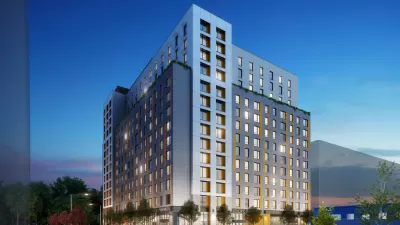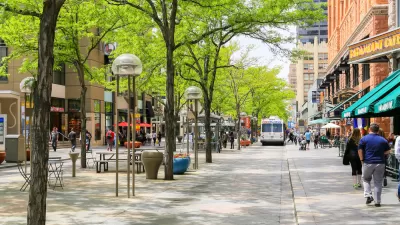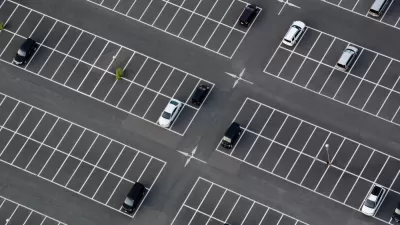Emily Badger looks at how a simple idea in energy retrofitting can be tailored to work for the largely untapped market of small to mid-size commercial properties.
There have been multiple incentive programs to assist single and multi-family residences as well as large commercial complexes in retrofitting their properties for energy efficiency. However, as Badger investigates, there is a lack of financial assistance for those who fall somewhere in the middle -- smaller commercial property owners.
"An estimated 95 percent of commercial building owners in the U.S. own small to mid-size properties, buildings of no more than 50,000-100,000 square feet, perhaps with a shop on the ground floor and a handful of offices or rental apartments above. These buildings take up 45 percent of all the commercial square footage in the country, and they consume an equally large share of America's annual commercial energy use."
Living City Block, a non-profit based in Denver, wants to change the lack of energy retrofitting in this market with a simple concept. Chad Riley, the director of finance and strategy talks about "creating a kind of building owners' association that has never been modeled before, one in which neighbors who otherwise have very little in common might make common decisions about pooling their trash pick-up, paying their utility bills, and renovating their properties."
The whole idea centers on communities combining their resources to achieve something a single individual property cannot. However, the additional cost savings achieved through the economies of scale provided by Living City Block come with at least one less desirable cost to property owners, a loss of some control over their properties. "It requires arranging a dozen moving pieces between the building owners and their utility providers, between the buildings and Living City Block, between Living City Block and the banks, between this small slice of the city and the Denver government. "
Living City Block is trying their aggregate method in downtown Denver and Brooklyn. If successful, they hope to expand the idea to cover waste management, storm water runoff and urban agriculture.
FULL STORY: Greening an Entire Block Instead of Just One Building

Alabama: Trump Terminates Settlements for Black Communities Harmed By Raw Sewage
Trump deemed the landmark civil rights agreement “illegal DEI and environmental justice policy.”

Study: Maui’s Plan to Convert Vacation Rentals to Long-Term Housing Could Cause Nearly $1 Billion Economic Loss
The plan would reduce visitor accommodation by 25% resulting in 1,900 jobs lost.

Planetizen Federal Action Tracker
A weekly monitor of how Trump’s orders and actions are impacting planners and planning in America.

Federal Homelessness Agency Places Entire Staff on Leave
The U.S. Interagency Council on Homelessness is the only federal agency dedicated to preventing and ending homelessness.

Restoring Northern India’s Himalayan ‘Water Temples’
Thousands of centuries-old buildings protect the region’s natural springs and serve as community wells and gathering places.

Milwaukee to Double Bike Share Stations
Bublr Bikes, one of the nation’s most successful, will add 500 new e-bikes to its system.
Urban Design for Planners 1: Software Tools
This six-course series explores essential urban design concepts using open source software and equips planners with the tools they need to participate fully in the urban design process.
Planning for Universal Design
Learn the tools for implementing Universal Design in planning regulations.
Caltrans
Smith Gee Studio
Institute for Housing and Urban Development Studies (IHS)
City of Grandview
Harvard GSD Executive Education
Toledo-Lucas County Plan Commissions
Salt Lake City
NYU Wagner Graduate School of Public Service





























